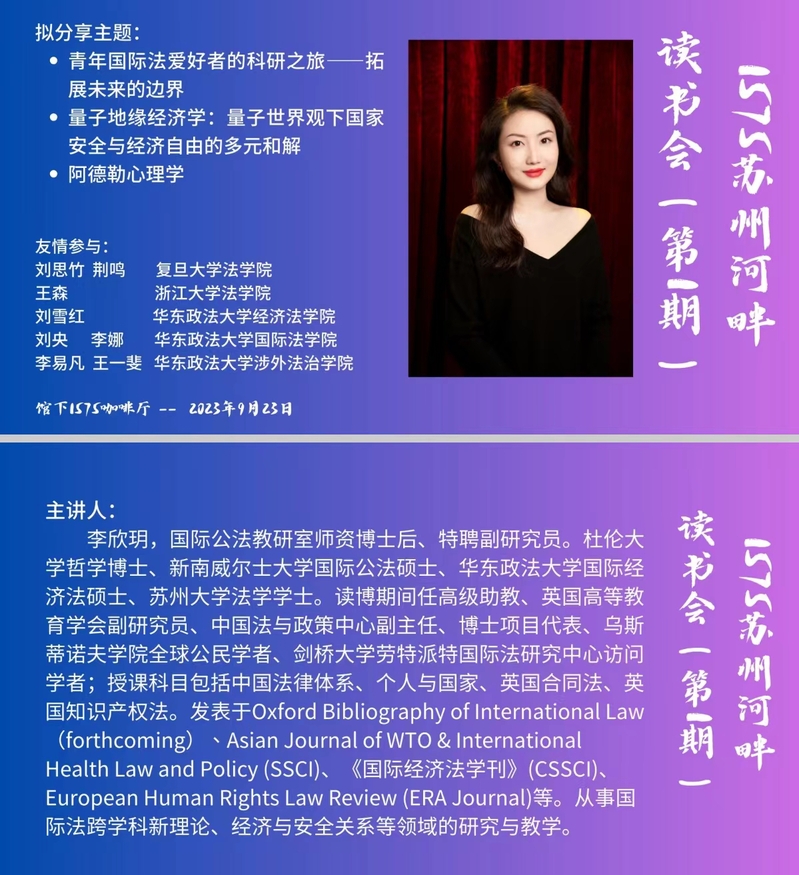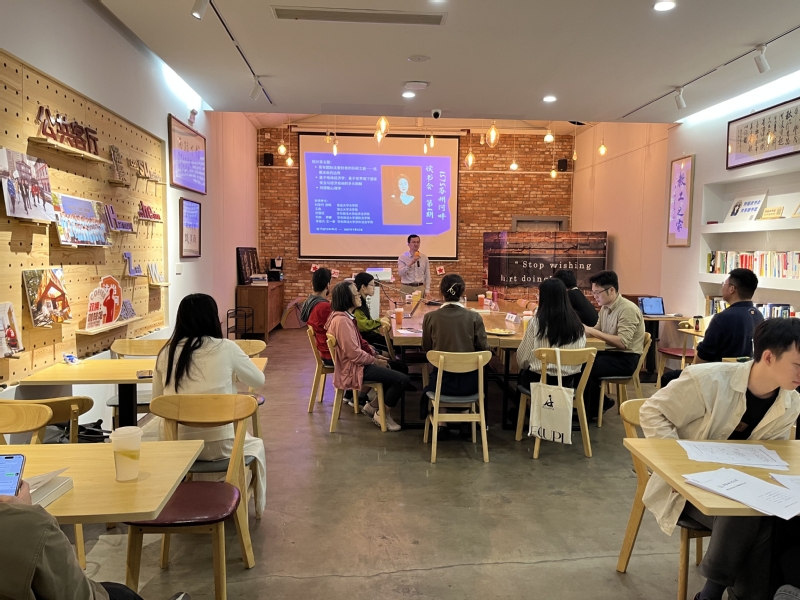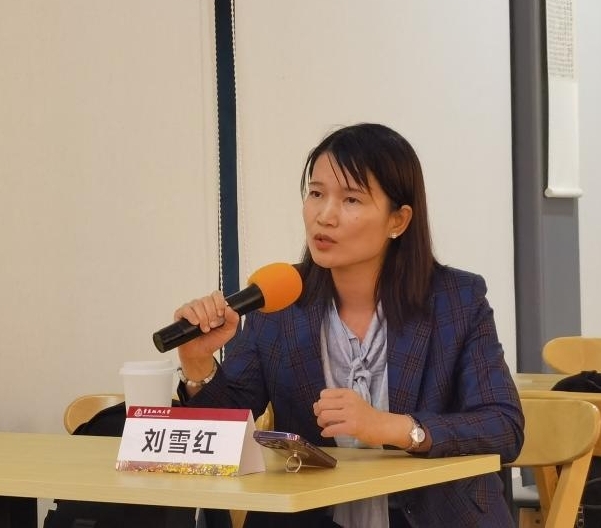On the evening of 23rd September, the first event of “1575 Suzhou Riverside Reading Club", hosted by the International Exchange Center and the International College of East China University of Political Science and Law (ECUPL), was successfully held.

The book club was thoughtfully hosted by Associate Professor Yichou Han, Deputy Director of International Exchange Center, Associate Dean, International College. Dr. Xinyue Li, a Post-doctoral/Associate Researcher at School of International Law, was warmly invited to address various topics, sharing her most recent insights during an open-dialogue with the audience. Professor, lectures, researchers, and doctoral and master’s degree students from Fudan University, Zhejiang University, East China University of Political Science and Law and other institutions, as well as foreign students, participated with enthusiasm and curiosity.

Dr. Xinyue Li has rich overseas study and research experience. She obtained a Ph.D. from University of Durham, a Master of Laws from University of New South Wales, a Master of Jurisprudence from East China University of Political Science and Law, and a Bachelor of Laws from Soochow University. She served as Senior Tutor of Law, Associate Fellow of the Higher Education Academy, Deputy Director of Centre for Chinese Law and Policy, and Global Citizenship Programme Scholar at Ustinov College in Durham. She was a visiting PhD scholar at the Lauterpacht Centre for International Law at University of Cambridge. She taught Chinese Legal System, Individual and the State, UK Contract Law, and UK Intellectual Property Law. She published at Oxford Bibliography of International Law (forthcoming), Asian Journal of WTO & International Health Law and Policy (SSCI),《国际经济法学刊(Chinese Journal of International Economic Law)》(CSSCI), and European Human Rights Law Review (ERA Journal). Her research interests include advanced multidisciplinary theories of international law and economic-security irreconciliation.




Three topics are discussed, titled “International Enthusiasts’ Researching Journey”, “Quantizing Geoeconomics: Pluralistic Reconciliation Between Security Protection and Economic Liberalization Through a Quantum Worldview”, and “The Psychology and Philosophy of Alfred Adler”, all of which generated heated debates. The audience were particularly interested in Dr. Li’s research on “quantizing geoeconomics”, which is a theoretical framework that adopts quantum theories as philosophies to interpret geoeconomics in order to propose the pluralistic reconciliation between national security and economic liberalization in international law. According to Dr Li, what justifies the use of quantum theories as superior philosophies for explaining the investment-security dynamic lie within their nature — first, they empirically better explain the available data, in comparison to the classical Newton-inspired theories; and second, they embrace resilience and applicability in emerging contexts, complementary to pluralism-informed theories. The “trinity of quantum international law theories” were introduced, encompassing the use of quantum entanglement, measurement, and holism theories through courses of analogy, ontology, and postcritique. By conducting case studies on cybersecurity, energy security, and investment security, the research discloses the deficiencies of economic-security practice in the present transitioning period and proposes an inclusive, open-realism, multidisciplinary model of thinking for lawmakers and policymakers to pluralistically reconcile what seems irreconcilable under orthodox ontologies, perceptions, and perspectives. Dr. Li calls for endeavors to experiment with quantum theories, or other multidisciplinary theories, in international law, as the main question remains not about balancing security risks and economic rewards in the present, which sometimes gives the impression of an ‘either-or’, ‘us-versus them’, binary fight, but more about ensuring resilience in the future, which generates understanding towards inclusion.

Finally, Associate Professor Han sincerely expressed his gratitude to all audience for their active engagement and insightful discussion, concluding the event with a preview of the next book club event. The audience stayed for more discussions and communications, appreciating both the time and energy of each other. 1575 Suzhou Riverside Reading Club series is designed to create a strong atmosphere of for “bookworms” of all kinds, for lovely souls who enjoyed reading and thinking. It is a friendly platform for idea exchanging and generating among readers in Shanghai and even the Yangtze River Delta.
Relevant Publications:
Xinyue Li (2023), ‘A Parallel Narrative: Pluralistic Reconciliation Through Quantizing Geoeconomics in (Cyber)security Governance in International Economic Law’, Asian Journal of WTO & International Health Law and Policy, SSCI, Vol.18.1, 89-130
Xinyue Li (2022), ‘Quantizing Geoeconomics: Emerging Geoeconomics in International Economic Law Through a Quantum Worldview’, Asian Journal of WTO & International Health Law and Policy, SSCI, Volume 17.1, 5-39
“WTO安全例外条款的限制性适用”,《国际经济法学刊》,CSSCI,2019年第2期, 80-92

